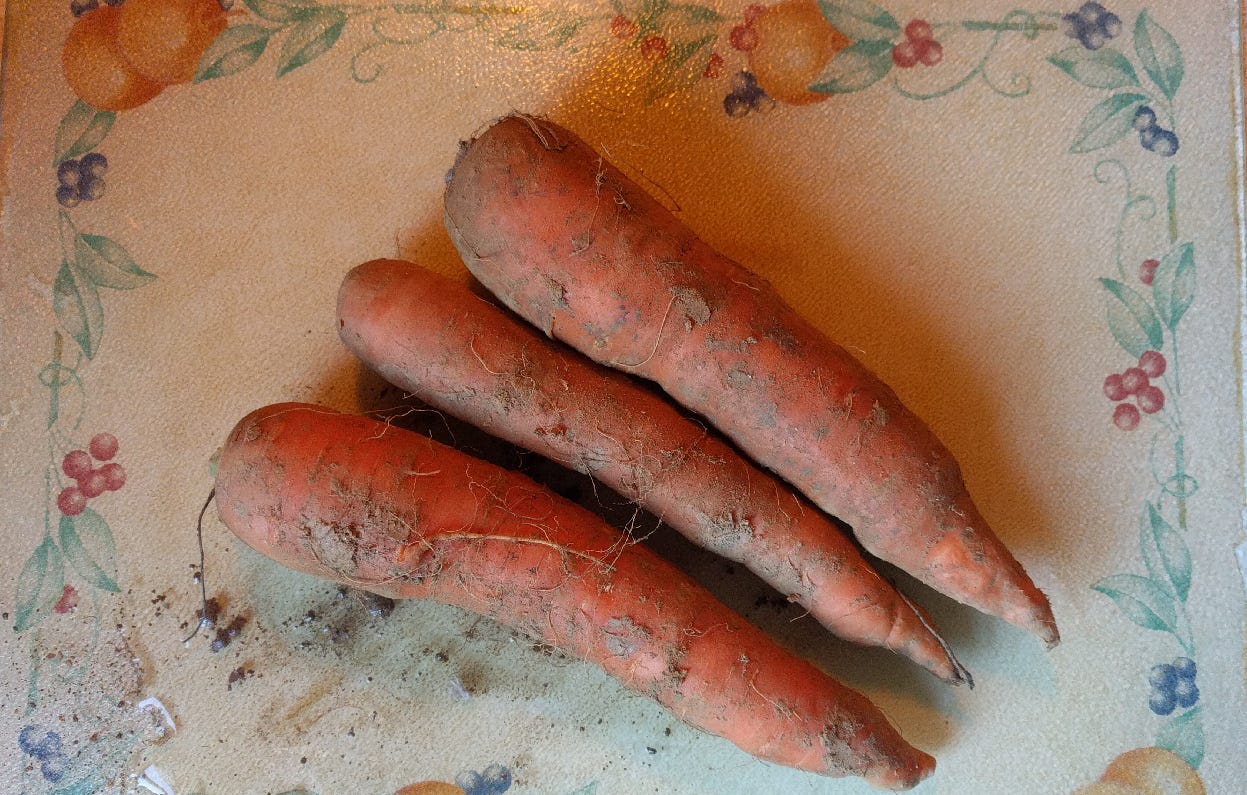Are Dirty/Raw/Ugly Vegetables Better for us?
The Wisdom of Keeping Vegetables in a Living State
Modern mass-scale produced fruits and vegetables need to be shelf-stable, uniform, clean and good looking. In my earlier article “The Foolish Quest for the Perfect Apple,” I explained some of the problems with perfect-looking, but often tasteless apples. In my articles and books I discuss how perfection often sacrifices resilience, quantity and scale often sacrifice quality, etc. In this article, I like to explain why keeping vegetables in their most natural state after harvest (with some soil, stored underground or in cool dark places) can extend their life and nutrient density.
I want to show you how we keep our carrots (whether from our own farm or ones we buy from our Amish friend locally). Because these carrots are not sprayed with pesticides, the soil around them is not toxic or dead, so it contains some of the minerals and nutrients, as well as microbiota needed by the carrots to retain their “Living state” as Albert Szent- Gyorgyi, one of my all-time favorite scientists, call it. We keep these in our cellar, a cool dark place with stables temperatures generally between 35-50 degrees Fahrenheit (in the Fall and Winter months).
We have noticed carrots stored this way keep their “living state” longest. How do we know? They remain crisp and do not wilt or become flaccid. Proteins and fibers remain structured by living energized “structured” water molecules.
As I reflect in my three books, my articles and my presentations (some placed on my video channels soon), “life begets life” and is the only force in universe that imposes order on chaos (a waste of Gibbs Free Energy). Chaos is a marker for “death” and loss of preserving nutrients like natural phytochemicals. You can read my article The Wisdom of Using Colors in Nature to Improve Our Health, (or soon watch it in video form on my video channels) to see why the natural phytochemicals in vegetables are best preserved in old-fashioned chemical-free farming methods like those we use on our farm. And I believe they extend their benefits during storage if we keep the vegetables close to their natural ecosystem and soil.
We thoroughly wash any soil (dirt is dead, soil is alive) off small batches of vegetables right before we get ready to use in salads or food (stews, soups, etc.).
Once you have tasted chemical-free fresh or properly-stored produce (like carrots and potatoes) or fruits, you would probably not buy perfect-looking ones, especially the non-organic ones. If you have access to local small family farms that use chemical-free regenerative farming, you can approach them and ask them for “bulk” pricing on say 30 pounds of second (or juicing) carrots “unwashed.” Many chemical-free farms would be happy to offer great prices on unwashed second (not perfect looking for the store, odd-shaped, etc.) sold in bulk as it saves them time and money. You may be able to buy amazingly delicious juicy but ugly, dirty chemical-free (real organic) carrots for $1 a pound that keep fresh for a couple months and tie you up for the fiber and Beta Carotene that your body (and eyes) need throughout the Winter.
Obviously, soil which is chemically-treated and/or fertilized with animal manure or chemical fertilizers close to harvest time is better washed off vegetables immediately after harvest.
We also store our own potato and garlic harvest “soiled.” We keep them close to their natural state for as long as possible in our cool dry dark cellar (partly underground so it has relatively stable temperatures).
And again wash them thoroughly in small batches before we enjoy them in foods. We know our potatoes are alive because occasionally we see some start to sprout.
In my next article, I will demonstrate the result of our experiments on the antioxidant properties of our potatoes and garlic vs. some of the perfect-looking potatoes and garlic you can buy in many stores. Here is a snapshot, which shows how our potatoes resisted enzymatic browning when cut and our garlic acted superbly in preventing enzymatic browning and degradation even on the store-bought non-organic potato.
In 1762, Jean-Jacques Rousseau wrote in the Social Contract: “Truth does not lead to fortune; and the people bestows neither Ambassadorships, professorships, nor pensions.” This is the book that was for the large part responsible for the freedoms we enjoy in America and for drafting the US Constitution.
Finding the truth about how things work, or do not work, is becoming increasingly difficult because most information today is sponsored by businesses. I don’t use highly-paid publicists and have no sponsors. You can help unsponsored folks like me share uncensored truth and discoveries by:
Subscribing to these blogs (preferably paid for less than $5 a month or as a free subscribe if you cannot afford it)
Sharing these articles as widely as possible.
Buy independently-published books on Amazon (no Big name publishers or influencers were paid to promote them!).
Arrange for me to present these topics in person, for free, near you.








